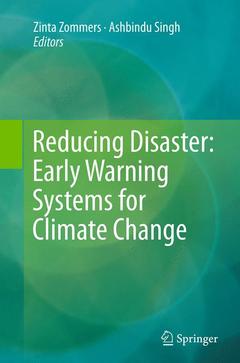Reducing Disaster: Early Warning Systems For Climate Change, Softcover reprint of the original 1st ed. 2014
Langue : Anglais
Coordonnateurs : Singh Ashbindu, Zommers Zinta

Around the world, extreme weather events are becoming increasingly "the new normal" and are expected to increase in the 21st century as a result of climate change. Extreme weather events have devastating impacts on human lives and national economies. This book examines ways to protect people from hazards using early warning systems, and includes contributions from experts from four different continents representing 14 different universities, 8 government agencies and two UN agencies. Chapters detail critical components of early warning systems, ways to identify vulnerable communities, predict hazards and deliver information. Unique satellite images illustrate the transnational impact of disasters, while case studies provide detailed examples of warning systems. With contributors from the fields of economics, ethics, meteorology, geography and biology, this book is essential reading for anyone interested in disaster risk reduction or climate change.
Introduction.- Chapter 1: The Impact of Climate Change on Natural Disasters.- Chapter 2: Challenges in Early Warning of the Persistent and Widespread Winter Fog over the Indo-Gangetic Plains: A Satellite Perspective.- Chapter 3: Assessing human vulnerability to climate change from an evolutionary perspective.- Chapter 4: Early Warning Systems Defined.- Chapter 5: The State of Early Warning Systems.- Chapter 6: Climate Change and Early Warning Systems for Wildland Fire.- Chapter 7: Climate Change Implications and Use of Early Warning Systems for Global Dust Storms.- Chapter 8: Applications of Medium Range Probabilistic Flood Forecast for Societal Benefits - Lessons Learned from Bangladesh.- Chapter 9: Flood forecasting and early warning: an example from the UK Environment Agency.- Chapter 10: The Evolution of Kenya’s Drought Management System.- Chapter 11: Understanding the warning process through the lens of practice: emancipation as a condition of action. Some lessons from France.- Chapter 12: The Effect of Early Flood Warnings on Mitigation and Recovery during the 2010 Pakistan Floods.- Chapter 13: Disasters are gendered: what’s new?.- Chapter 14: The Ethics of Early Warning Systems for Climate Change.- Chapter 15: Decadal Warning Systems.- Chapter 16: The role of scientific modelling and insurance in providing innovative solutions for managing the risk of natural disasters.- Chapter 17: “Follow the spiders”: Ecosystems as Early Warnings.- Chapter 18: Natural hazards and Climate Change in Kenya: Minimizing the impacts on vulnerable communities through Early Warning Systems.
Ashbindu Singh has 30 years of work experience: 13 years working with the Indian Forest Service in various capacities at local, provincial and national levels and over 17 years with UNEP in different parts of the world. He has over 100 publications including 35 UNEP reports, in peer reviewed scientific journals and conferences, on various environmental issues. Findings of his research work are extensive referred by the scientific community and those involved in the environmental policy formulations. The team under his direction has produced highly influential reports on various environmental issues including global forests, threats to freshwater, coastal vulnerability, linkage between environment and health, environmental conflicts , transboundary air pollutants, biodiversity and UNEP’s best selling publication “One Planet many people: Atlas of our changing environment” His current interest focuses on how to bridge the gap between science and policy and applications and communication of earth observations technologies for environmental assessment and monitoring. As a Commonwealth and Rhodes scholar, Zinta is currently pursuing a DPhil in Zoology with the Wildlife Conservation Research Unit at the University of Oxford. She has been working with the United Nations Environment Programme as a coordinating lead author of the Global Environment Outlook Report, UNEP's flagship state of the environment report. In her research, Zinta has also explored the interaction between human and natural worlds and the impact of this complex relationship on wildlife. Much of her work has focused on great apes.
This book will be of interest to scientists involved in climate change, experts in international organizations donor institutions and government agencies Will offer practical tools with which to better early warning systems, identify vulnerable communities and improve hazard forecasting Will assess current & future risks of natural disasters & extreme events Includes supplementary material: sn.pub/extras
Date de parution : 09-2016
Ouvrage de 387 p.
15.5x23.5 cm
Date de parution : 05-2014
Ouvrage de 387 p.
15.5x23.5 cm
Thème de Reducing Disaster: Early Warning Systems For Climate Change :
Mots-clés :
© 2024 LAVOISIER S.A.S.



